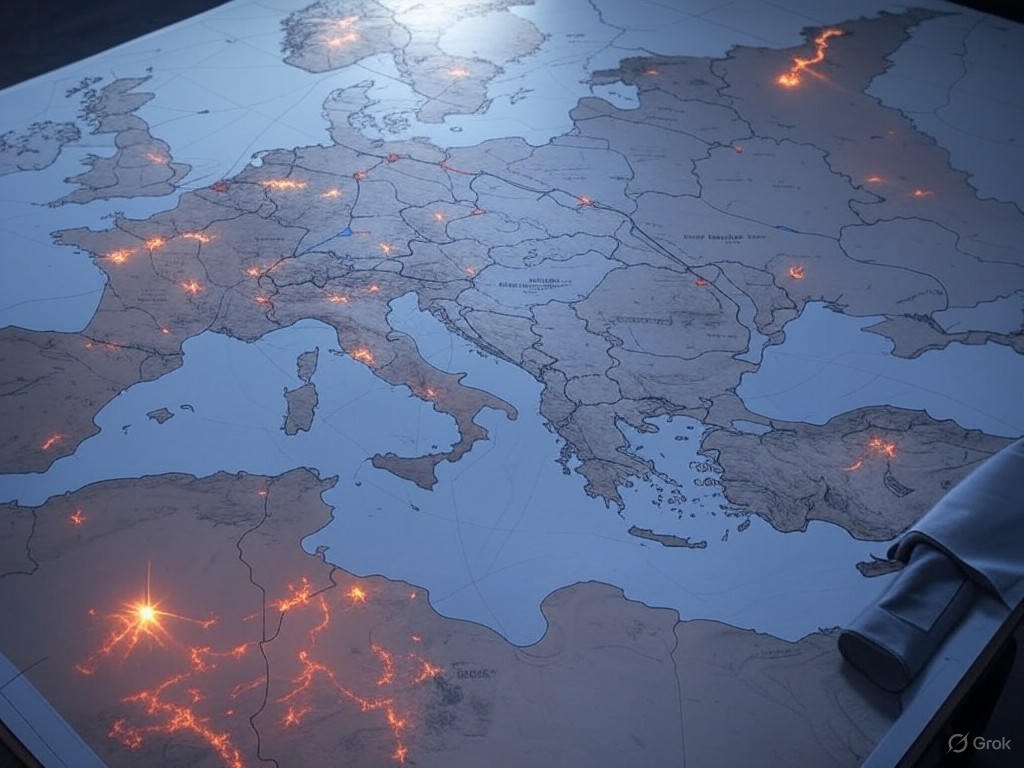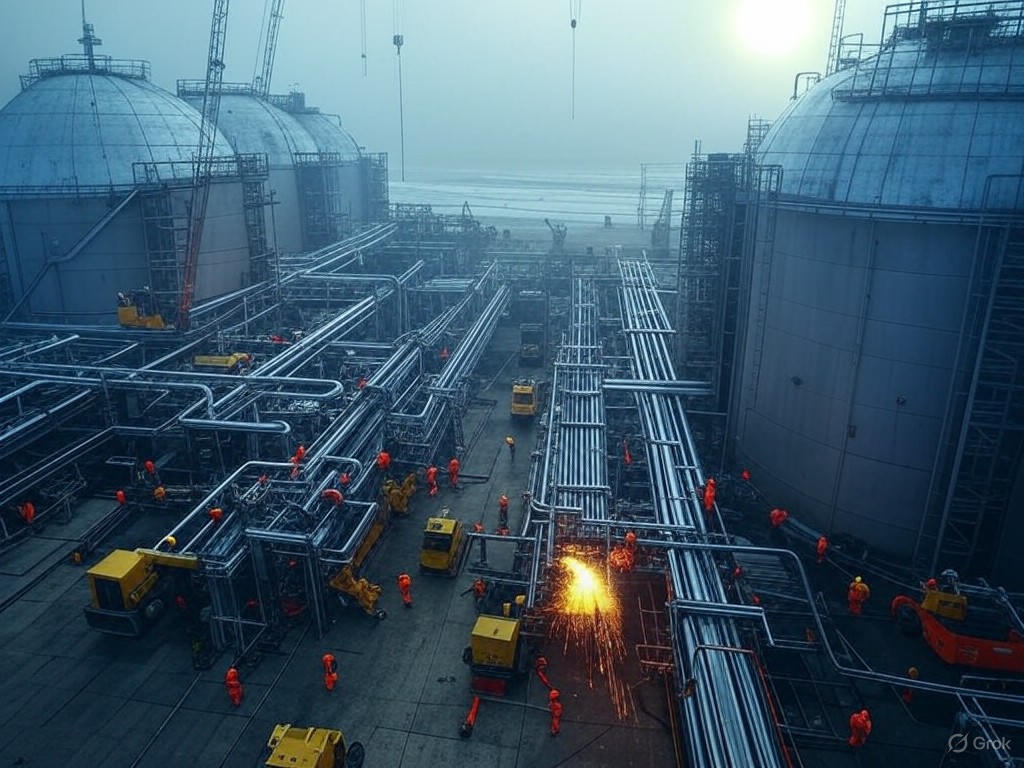Russia-Ukraine War: Europe’s Energy Crisis Deepens
In the grand theater of global affairs, where nations play high-stakes poker with resources and alliances, Europe's energy security has become a glaring cautionary tale. The ongoing Russia-Ukraine conflict has thrown a wrench into the continent's gas supply, exposing vulnerabilities that were, let's face it, as predictable as a rainy day in London. As pipelines from the east sputter and prices soar, Europe finds itself in a frantic scramble for alternatives. This isn't just an energy crisis; it's a wake-up call for a region that's long favored convenience over foresight. From a center-right vantage, the solution lies not in expansive government mandates but in embracing free-market ingenuity and self-reliant strategies that prioritize economic stability and traditional energy diversification.
The Disruptions Unfolding: A Geopolitical Powder Keg
The Russia-Ukraine conflict has laid bare Europe's precarious dependence on Russian gas, with pipelines like Nord Stream 1 and 2 serving as lifelines that can be throttled at a moment's notice. Since February 2022, when Russian forces invaded Ukraine, gas flows from Moscow have dwindled, either through deliberate cutoffs or retaliatory sanctions, sending shockwaves through European markets. Countries such as Germany, Italy, and Hungary—once basking in the affordability of Russian supplies—now face blackouts and inflated energy bills that hit households and industries alike. This disruption isn't merely logistical; it's deeply geopolitical, as the Wall Street Journal reports, highlighting how energy has become a tool of leverage in international disputes.
One might chuckle at the irony: Europe's progressive push for "green" energy transitions left it overly reliant on a single supplier, akin to a shrewd businessman betting his fortune on a single stock. The energy crisis has driven natural gas prices to record highs, with European benchmarks like TTF futures spiking over 400% in 2022 alone. This volatility underscores a fundamental flaw in energy policy: an overemphasis on short-term gains at the expense of strategic autonomy. A center-right perspective applauds the market's corrective mechanisms—higher prices incentivizing innovation and new suppliers—but warns against knee-jerk government interventions that could stifle competition and prolong the pain.
Amid this turmoil, Europe is rushing toward alternative sources, from liquefied natural gas (LNG) imports to ramped-up domestic production. Yet, this pivot raises questions about the role of free markets in smoothing the transition. Governments are tempted to impose price caps and subsidies, but such measures often distort incentives, as evidenced by past energy shocks. Instead, fostering a competitive landscape where private firms can negotiate deals with reliable partners—like the U.S. or Qatar—could restore balance without bloating public coffers.

This map illustrates the web of pipelines from Russia to Europe, with red lines indicating routes affected by the Russia-Ukraine conflict, underscoring the continent's exposed underbelly in energy geopolitics.
Analyzing the Rush for Alternatives: Markets vs. Mandates
As Europe grapples with this energy upheaval, the analysis reveals a dichotomy between market-driven responses and heavy-handed regulation. The conflict has accelerated investments in LNG terminals and renewable projects, but the path forward demands a pragmatic blend of traditional values and economic realism. For instance, nations like Poland and the Netherlands are expanding their use of North Sea gas fields and forging deals with American exporters, a move that aligns with free-market principles by decentralizing supply chains and reducing geopolitical risks.
However, not all responses are equally prudent. The European Union's push for rapid decarbonization, while noble in intent, has inadvertently amplified vulnerabilities by phasing out coal and nuclear power too hastily. According to the International Energy Agency's World Energy Outlook, Europe's dependence on Russian gas accounted for about 40% of its imports before the war, a figure that's now a glaring liability. This report, which paints a stark picture of global energy transitions, suggests that diversified portfolios—including fossil fuels as a bridge—could stabilize prices without abandoning long-term sustainability goals.
From a center-right lens, the key is to let markets lead. Governments should facilitate, not dictate, by streamlining regulations for private exploration and trade. Take, for example, the U.S. shale boom, which transformed America into a net energy exporter. As Reuters details in its coverage of global energy shifts, countries that embrace such innovation reap rewards, while those clinging to bureaucratic controls lag behind. Europe's current predicament serves as a reminder that traditional values—self-reliance, fiscal prudence, and robust private enterprise—are not relics but essential tools for navigating modern challenges.
This rush for alternatives isn't without its hurdles. Soaring prices have sparked inflation across the eurozone, eroding consumer confidence and threatening economic growth. Yet, rather than resorting to widespread bailouts, policymakers should encourage market adaptations, such as flexible pricing mechanisms that reward efficiency and conservation. After all, as any astute observer knows, true resilience comes from empowering individuals and businesses, not from the paternalistic hand of the state.
Evidence of Strain and Opportunity: Data and Realities on the Ground
The evidence paints a vivid picture of the crisis's impact. Data from Eurostat shows that household energy costs in the EU rose by an average of 65% in 2022, with Germany facing blackouts during peak winter months. This surge isn't just a numbers game; it's a human story, affecting factories in Milan that halt production and families in Paris rationing heat. Geopolitically, the conflict has reshaped alliances, with NATO members accelerating defense spending and energy partnerships, as chronicled in the Heritage Foundation's analysis of global security trends.
Yet, amid the gloom, opportunities abound for free-market solutions. Countries like France, with its established nuclear infrastructure, are well-positioned to fill gaps, while emerging LNG deals with suppliers in the Middle East and Africa demonstrate the benefits of open trade. A Brookings Institution report on energy geopolitics reinforces this, noting that diversified imports could cut Europe's reliance on any single nation to below 20% by 2030, if market forces are allowed to flourish.
Ironically, the crisis has even spurred innovation in renewables, with private investments in wind and solar surging. But let's not kid ourselves: These technologies require stable grids and affordable backups, which means integrating traditional sources wisely. The sardonic twist here is that Europe's "green rush" might have been less frantic had policymakers heeded market signals earlier, avoiding the pitfalls of overregulation that have plagued other sectors.

Workers at a new LNG import terminal in the Netherlands, symbolizing Europe's hurried pivot to alternative energy sources as Russian supplies dwindle.
Charting a Path Forward: Embracing Self-Reliance
In conclusion, the Russia-Ukraine conflict has thrust Europe's energy security into the spotlight, forcing a reckoning with decades of complacency. As prices stabilize and supplies diversify, the continent must pivot toward free-market principles that emphasize limited government intervention, robust competition, and a nod to traditional values like energy independence. Policymakers should resist the urge for sweeping regulations and instead focus on removing barriers to trade, investing in infrastructure through public-private partnerships, and encouraging domestic innovation.
This approach not only mitigates immediate risks but also fosters long-term prosperity. Europe can emerge from this crisis stronger, not as a supplicant to foreign powers, but as a model of resilient, market-driven economies. As we've seen, when nations trust in the ingenuity of their people and the efficiency of free enterprise, even the most disruptive storms can lead to clearer skies ahead.

